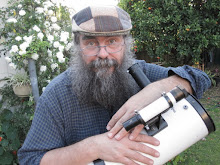Sunday, November 07, 2004
Another aurora alert
Hope someone got to see the Venus-Jupiter alignment
http://www.spaceweather.com/swpod2004/05nov04/Mammana1.jpg. I saw rain.
The Sun has been popping off M-class solar flares and coronal mass
ejections at a rate of knots since the 3rd (see
http://www.spaceweather.com/images2004/04nov04/cme_c3.gif for a movie of a
recent one). Double sunspot 696 is the main culprit. The complex nature of
these CME's means that their arrival time is more difficult to predict and
their effects even more so. Geomagnetic activity is expected to rise
tonight and remain elevated for a few days. Minor storms are predicted for
high latitudes (Tasmania, Southern New Zealand, Australian Antarctic
Territories) tonight, tomorrow and the day after (Saturday 6th, Sunday 7th
and Monday 8th). Aurora can strike any time, although the best time to look
to the south is after local midnight.
To brighten up your observing time, check out http://www.heavens-above.com/
to see if the ISS or other bright satellites will fly over, or maybe you
can catch an Iridium flare.
The waning moon may interfere with seeing any aurora in the early morning,
and dark sky sites have the best chance of seeing anything.
http://www.spaceweather.com/swpod2004/05nov04/Mammana1.jpg. I saw rain.
The Sun has been popping off M-class solar flares and coronal mass
ejections at a rate of knots since the 3rd (see
http://www.spaceweather.com/images2004/04nov04/cme_c3.gif for a movie of a
recent one). Double sunspot 696 is the main culprit. The complex nature of
these CME's means that their arrival time is more difficult to predict and
their effects even more so. Geomagnetic activity is expected to rise
tonight and remain elevated for a few days. Minor storms are predicted for
high latitudes (Tasmania, Southern New Zealand, Australian Antarctic
Territories) tonight, tomorrow and the day after (Saturday 6th, Sunday 7th
and Monday 8th). Aurora can strike any time, although the best time to look
to the south is after local midnight.
To brighten up your observing time, check out http://www.heavens-above.com/
to see if the ISS or other bright satellites will fly over, or maybe you
can catch an Iridium flare.
The waning moon may interfere with seeing any aurora in the early morning,
and dark sky sites have the best chance of seeing anything.
Comments:
<< Home
Is there any place or website where you can keep following the latest happenings in the space frontier?
Post a Comment
<< Home




 Click to read about or order
Click to read about or order Click to read about or order
Click to read about or order Click to read about or order
Click to read about or order Click to read about or order
Click to read about or order




